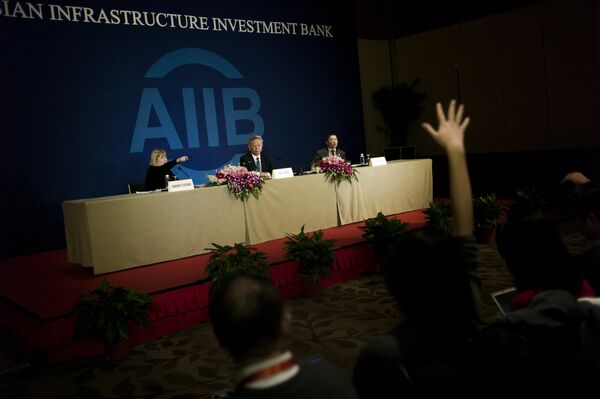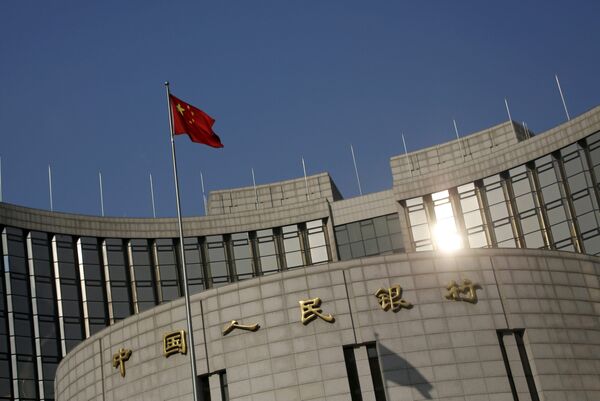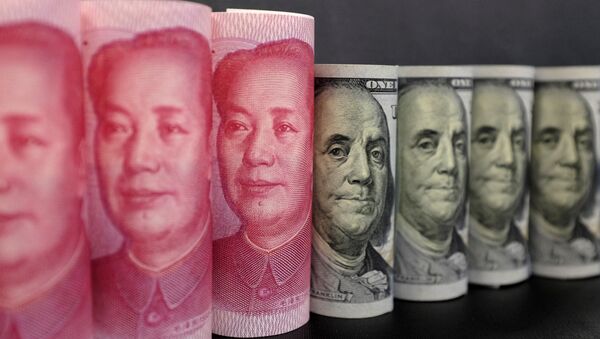In July 2019, the Asian Infrastructure Investment Bank (AIIB) started offering local-currency financing to private companies in India, Indonesia, Thailand, Turkey and Russia.
"The AIIB's offer meets the financing needs of local companies at a time when they are feeling increasingly insecure about the US dollar, as the Trump administration often imposes financial sanctions on other countries", Global Times, a daily Chinese newspaper outlined on 17 July.
The China-based bank announced its plan to kick off local currency lending in order to diminish cross-border investment risks triggered by exchange-rate fluctuations in January 2019, citing "recent currency volatility in emerging markets", trade disputes sparked by Washington and potential global economic slowdown.
The AIIB was founded in order to facilitate the financing of infrastructure projects and to ensure the development of the Asia-Pacific Region within the framework of the China-led One Belt and One Road (OBOR) initiative. While the two endeavours are not formally associated, the AIIB and OBOR are complementary.
AIIB's Measure 'Must Inevitably Have an Impact on Dollar's Positions'
"This is a very timely initiative as many countries urgently need finance for their infrastructure development but are worried about currency fluctuations, e.g. the likelihood of a rise in the value of the US dollar. They are worried that such a rise would make it difficult for them to repay loans contracted in dollars", explains Donald Gasper, an independent Hong Kong-based analyst.
Gasper recalled the Asian financial crisis of 1997 that was partially triggered by the problems faced by Thailand and other countries in repaying loans denominated in the US dollar. The crisis started with the collapse of the Thai national currency, the baht, after the country's government was forced to float it due to a lack of foreign currency. The domino effect of the baht's slump affected much of East Asia and Southeast Asia at the time.
"The availability of other options will lessen the need to depend on the dollar, which must inevitably have an impact on the dollar's positions", the analyst emphasises.
Jason P. Imbrogno, assistant professor of economics at the University of North Alabama, holds a different opinion.
"The US dollar is the world’s biggest reserve currency and the most commonly accepted internationally for lending purposes", argues Imbrogno. "Any reliable means of reducing that monopoly power would theoretically reduce the value of the US dollar. I’m a bit sceptical that this AIIB will be quickly accepted as a reliable source for funds, but it could build up that credibility within a few years".

AIIB's New System Not Dependent on New York or London
According to Don M. Chance, a professor of finance at the E. J. Ourso College of Business at Louisiana State University, the AIIB lending initiative was kicked off "mostly for hedging purposes", as "there is a lot of fear of exchange rate volatility".
"Let’s say a company is planning a project in another country and needs that country’s currency", the finance expert explains. "Between the time it plans the project and the time it needs the financing, the currency it needs could increase in value and that would make the project more expensive than planned".
He highlights that "by offering local financing, it would essentially be borrowing in the local currency instead of using its own currency and converting it to the local currency".
For his part, Adam Garrie, a UK-based geopolitical analyst and director of the Eurasia Future think tank, cites the fact that many of those participating in the AIIB's new lending programme "have been subject either to the pangs of vicious currency speculation, sanctions or have otherwise found that whilst the Federal Reserve's quantitative tightening has been good for the dollar, it has caused stress in emerging markets that are deeply indebted to Western banks".
"Because of this, by creating a parallel system of finance that isn't dependent on New York or London, the AIIB's plan can help to tailor specific loan packages to the needs of emerging markets and specifically those that have been on the short end of Washington's recent policies", the geopolitical analyst explains.
Garrie points out that "China has already shown that it is willing to take risks in order to provide lines of credit to emerging markets because Chinese financiers tend to take a much longer view of the classical cost-benefit analysis than do most Western financiers".
However, the think tank director insists that "the AIIB is not seeking to change the world's monetary system but is instead aiming to create a financial network of friendly nations that see themselves as partners rather than rivals".
"The AIIB's long term goal is to create a financial network aimed at fostering cooperation, trust and solvency among Belt and Road partner nations", Garrie elaborates. "As such, the AIIB will continue to practice less predatory and more bespoke lending practices than the Western financial establishment. This is clearly a good thing for most emerging markets".

China's Alternative to SWIFT Comes In Handy
Tom McGregor, a Beijing-based political analyst and senior editor for China's national broadcaster CCTV, highlights that the timing of the AIIB local-currency financing initiative coincided with the development of the Cross-Border Interbank Payment System (CIPS) - Beijing's alternative for the Society to Worldwide Interbank Financial Telecommunication (SWIFT).
"SWIFT relies on the US dollar to conduct cross-border bankwire transactions, with the exception of transfers between UK and EU banks", McGregor underscores. "Accordingly by default, the US dollar stays strong since it’s the most widely-traded currency in the world. But Beijing will change the trends with the advent of CIPS, so that the Chinese yuan, not US dollars, will be exchanged directly with India, Indonesia, Thailand, Turkey and Russia, via the Asian Infrastructure Investment Bank local currency financing, which started on July 19".
"It makes good sense, since replacing the US dollar with the yuan in currency exchanges would reduce the time and transaction fees in the process", the CCTV editor adds.
McGregor elaborates that while the AIIB's plans to maintain business ties with countries subjected to unilateral sanctions by Washington or Brussels, CIPS comes in handy as it does not need SWIFT to proceed with cross-border transactions. It could also encourage those nations to strengthen their local currencies, especially if their access to the dollar is limited, the Beijing-based journalist concludes.
Having been launched in October 2015, CIPS grew 80 percent in value terms in 2018, according to a Nikkei May 2019 survey, which dubbed the Chinese clearing and settlement services system "a rising challenge to the hegemony of the US dollar". The survey found that CIPS had processed 26 trillion yuan ($3.77 trillion) of payments in 2018 only. Russian, Turkish, and Venezuelan banks have already jumped on the CIPS bandwagon.
The views and opinions expressed by the speakers and contributor do not necessarily reflect those of Sputnik.


